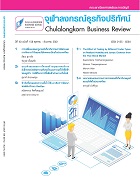Factors Affecting the Behavioral Intention to Use the DevOps Concept for Software Development
Main Article Content
Abstract
Nowadays, businesses are rapidly changing, so software development and delivery processes must be fast and flexible. Many businesses have adopted an Agile development methodology, which focuses on the process that meets the user requirements in order to supports the changing of business requirements. However, it does not cover the continuity and automation delivery of the software. Meanwhile, DevOps concept deals with processes start from software development to delivery process which emphasis on collaboration between product manager, software development team, and operations team. Although this concept is supported by public administration and private sectors, it still has yet to be fully explored in Thailand.
The purpose of this research was to study the factors affecting the behavioral intention to use the concept of DevOps software development. The research consists of project dimension (the characteristics of the Agile project factor) and technical dimension (the availability of technology tools that support the DevOps concept factor) that have an influence on the compatibility factor between work and technologies. In addition, organizational dimension (the executive support factor), people dimension (self-efficacy and perceived of usefulness factors) and process dimension (Agile software development usage factor). The results shown that the perceived of usefulness factor was the most influential intention to use DevOps concept. Followed by, self-efficacy factor, compatibility factor between work and technologies, and executive support factor respectively. On the other hand, Agile software development usage factor did not support the intention to use the DevOps concept.
Article Details
Opinions and discussions in papers published by the Creative Business and Sustainability Journal (CBSJ) are deemed as personal opinions and the responsibility of the writers. They are not the opinions or responsibility of the Chulalongkorn Business School of Chulalongkorn University.
Papers, content, information etc. appearing in the Journal are deemed to be the copyright property of the Chulalongkorn Business School of Chulalongkorn University. Anybody or any organization that wishes to publish any part of them or use them in any way must obtain written permission from the Chulalongkorn Business School, Chulalongkorn University.


